Coconut water and coconut milk are both derived from coconuts, but they are not the same thing. While they come from the same source, they have different compositions, flavours, and uses. This article will explore the differences between coconut water and coconut milk to help you understand their unique characteristics and how they can be used.
Coconut water vs Coconut milk?
Coconut, often called the “tree of life,” has provided humanity with many essential resources for centuries. Among its most cherished offerings are coconut water and coconut milk, which play significant roles in various cultures and cuisines worldwide. These two distinct liquids are extracted from different parts of the coconut fruit and offer unique flavours, nutritional benefits, and culinary applications.
- Coconut water, often called “nature’s sports drink,” is the clear, refreshing liquid found within young green coconuts. Celebrated for its natural hydration properties and delicate, slightly sweet taste, coconut water has gained immense popularity as a healthy alternative to traditional beverages. Rich in electrolytes like potassium, magnesium, and calcium, it has become a favourite among fitness enthusiasts, athletes, and those seeking a revitalizing drink.
- Coconut milk is a creamy and versatile liquid derived from the grated flesh of mature coconuts. Unlike coconut water, coconut milk boasts a richer consistency and a more pronounced coconut flavour. This luscious liquid is integral to many cuisines, adding depth and richness to dishes ranging from curries and soups to desserts and beverages. The extraction process involves blending the coconut flesh with water and then straining it to obtain the milk, which can vary in thickness depending on the desired culinary application.
This exploration delves into the captivating world of coconut water and coconut milk. We will uncover their nutritional profiles, delve into their cultural significance across different regions, and examine how they are incorporated into culinary delights. From the tropical shores where coconuts thrive to the global kitchens where their essence is cherished, join us in discovering the wonders and joys that coconut water and coconut milk bring to our tables and lives.
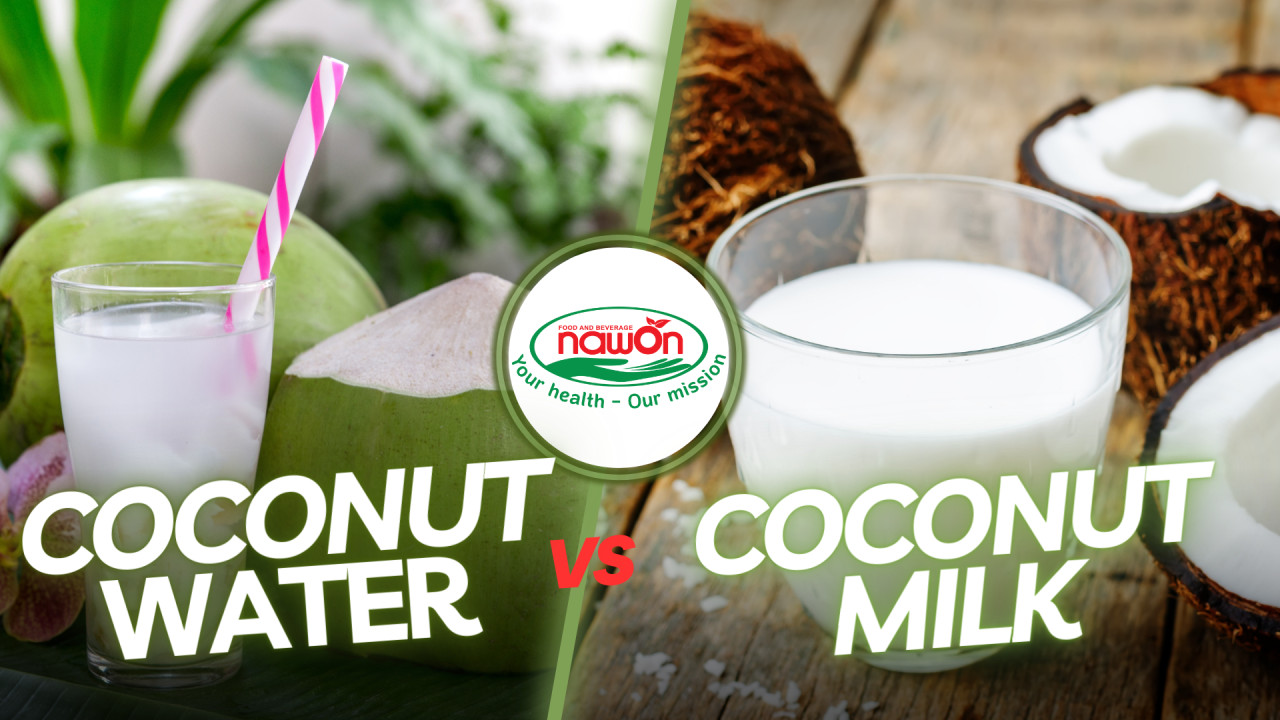
Read more: Coconut Water Nutrition Facts And Health Benefits
The differences between coconut water vs coconut milk
Source and extraction
- Coconut Water: Coconut water is the clear liquid found inside young, green coconuts. It is a natural component of the coconut fruit and is obtained by drilling a hole into the coconut’s shell.
- Coconut Milk: Coconut milk is derived from the grated flesh of mature coconuts. The white inner flesh is grated, mixed with water, and then strained to extract the milk.
Color and appearance
- Coconut Water: Coconut water is clear and slightly cloudy, resembling a light, refreshing beverage.
- Coconut Milk: Coconut milk is creamy and opaque, with a white color and a thicker consistency.
Nutritional content
- Coconut Water: Coconut water is low in calories and contains electrolytes such as potassium, sodium, magnesium, and calcium. It’s also a good source of hydration and provides some vitamins and minerals.
- Coconut Milk: Coconut milk is higher in calories due to its fat content. It’s rich in healthy fats, particularly medium-chain triglycerides (MCTs), and provides vitamins, minerals, and some dietary fiber.
Fat content
- Coconut Water: Coconut water is virtually fat-free.
- Coconut Milk: Coconut milk is relatively high in fat, particularly saturated fats, which contribute to its creamy texture and nutritional profile.
Caloric content
- Coconut Water: Coconut water is low in calories, making it a lighter beverage option.
- Coconut Milk: Coconut milk is higher in calories due to its fat content. It’s often used in cooking and baking to add richness and flavor.
Culinary uses
- Coconut Water: Coconut water is primarily consumed as a beverage for hydration and refreshment. It’s also used as a base in some smoothies and beverages.
- Coconut Milk: Coconut milk is a versatile ingredient used in cooking and baking. It adds creaminess, flavor, and richness to a wide range of dishes, including curries, soups, sauces, desserts, and beverages.
Texture and consistency
- Coconut Water: Coconut water has a thin and watery consistency.
- Coconut Milk: Coconut milk has a creamy and thicker consistency due to its fat content.
Culinary substitutes
- Coconut Water: Coconut water is not often used as a direct substitute for coconut milk in recipes due to its different texture and flavor.
- Coconut Milk: Coconut milk is frequently used as a dairy milk substitute in recipes to provide creaminess and a coconut flavor.
In summary, coconut water is a clear, hydrating liquid found in young coconuts, while coconut milk is a creamy liquid extracted from the grated flesh of mature coconuts. They have distinct nutritional profiles and culinary applications, with coconut water being a natural source of electrolytes and hydration, while coconut milk is valued for its versatility and richness in cooking and baking.
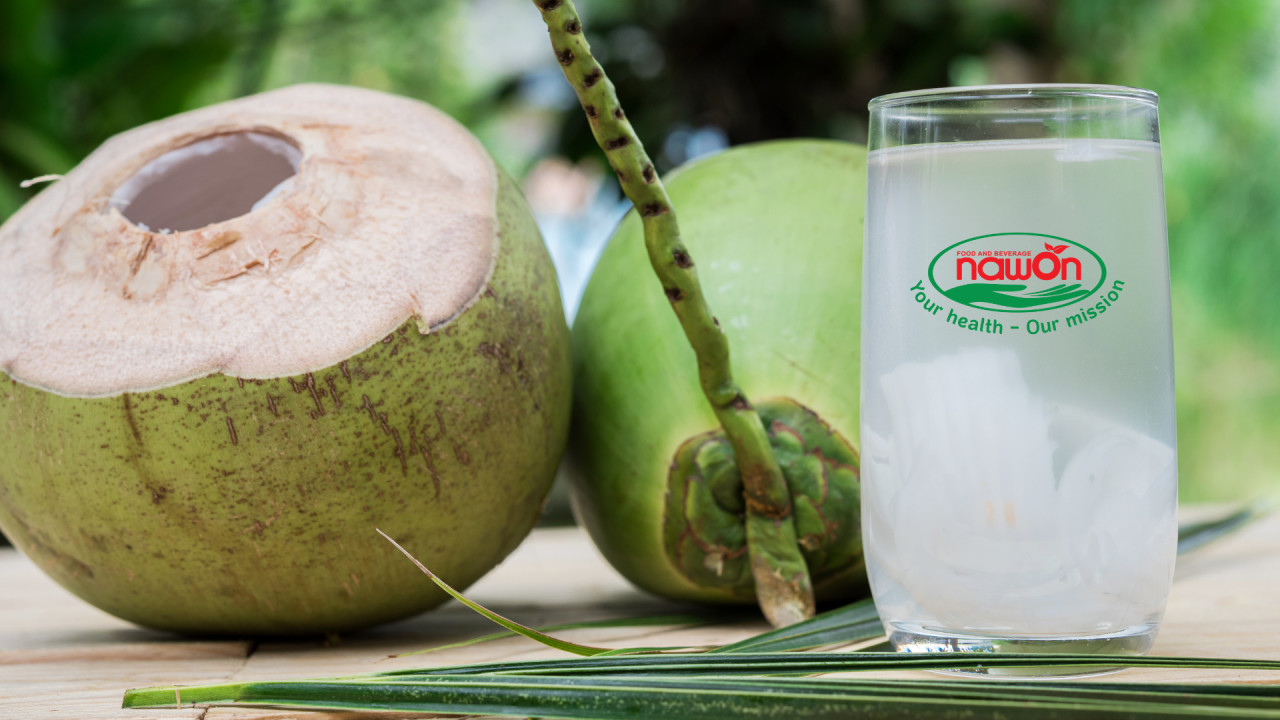
Read more: 15 Best Coconut Water Brands
The difference in preparation between coconut water and coconut milk
Where does coconut water come from?
Coconut water is the clear liquid found inside young, green coconuts. It is a natural component of the coconut fruit and serves as a nourishing fluid to support the growth of the coconut embryo. As the coconut matures, the water gradually decreases and is replaced by the solid coconut meat.
The water forms within the endosperm, the inner part of the coconut, which eventually becomes the coconut’s flesh as it develops. This water is initially sterile and serves as a protective environment for the developing embryo. As the coconut matures, the water absorbs nutrients from the endosperm, making it a nutrient-rich liquid.
Coconut water is typically extracted from coconuts that are around 5 to 7 months old. At this stage, the coconut’s outer husk is still green, and the water inside is plentiful and clear. The water is accessed by drilling a hole into the coconut’s shell, allowing for the collection of the liquid. It’s important to note that as the coconut continues to mature, the water gradually diminishes and is replaced by the coconut meat.
Coconut water is highly prized for its natural hydration properties and its rich content of electrolytes, vitamins, and minerals. It’s often consumed as a refreshing beverage and has gained popularity as a healthy alternative to sugary sports drinks or other flavored beverages.
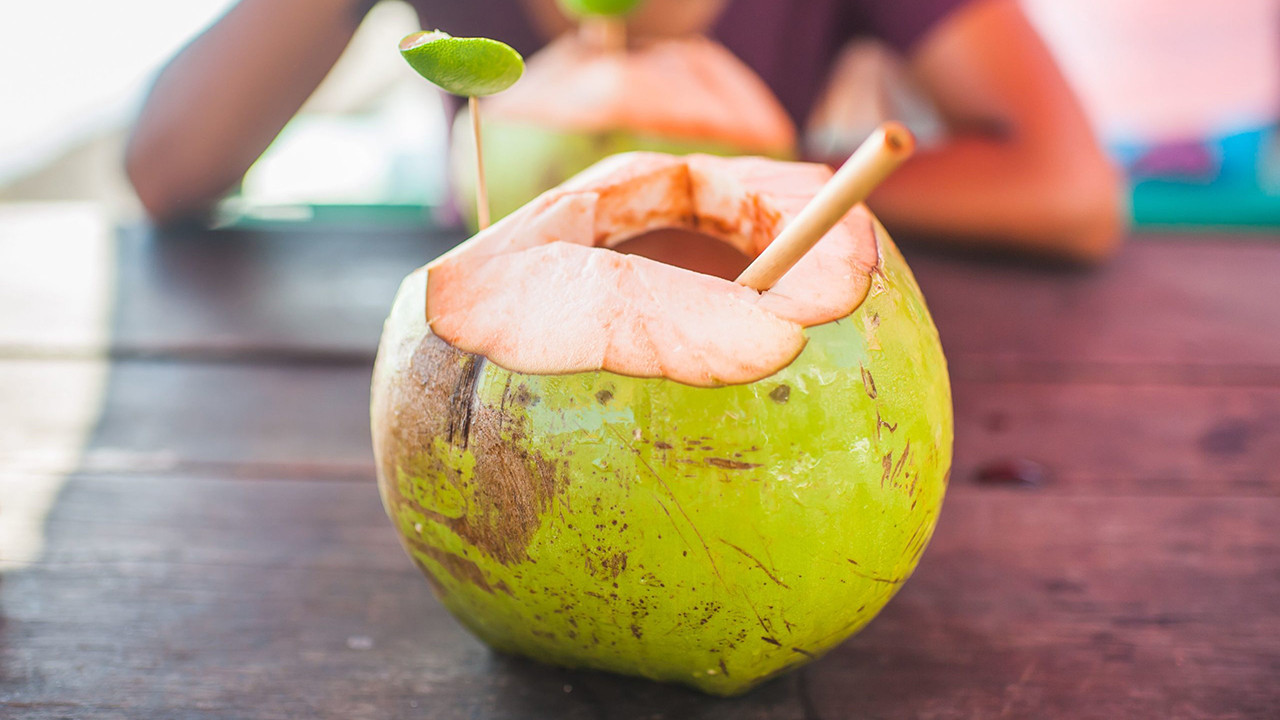
Read more: Coconut Water Nutrition Facts
Where does coconut milk come from?
Coconut milk is made from the grated flesh of mature coconuts, unlike coconut water, the clear liquid in young coconuts. The process starts with grating the white flesh, or “copra,” and mixing it with water to create a coconut-water mixture. This mixture is then blended to release oils and break down solids. After blending, it is strained through a fine mesh or cheesecloth, resulting in coconut milk and leaving behind the solid pulp, known as “coconut meal.” In some methods, the pulp is squeezed again to produce a thinner liquid called “second extract” or “thin coconut milk.”
Coconut milk may naturally separate into a creamy layer on top, known as “coconut cream,” and a thinner layer below. It is a staple in many tropical cuisines, used in dishes like curries, soups, desserts, and beverages, adding flavor and creaminess. Its fat content enhances texture and overall flavor in various recipes.
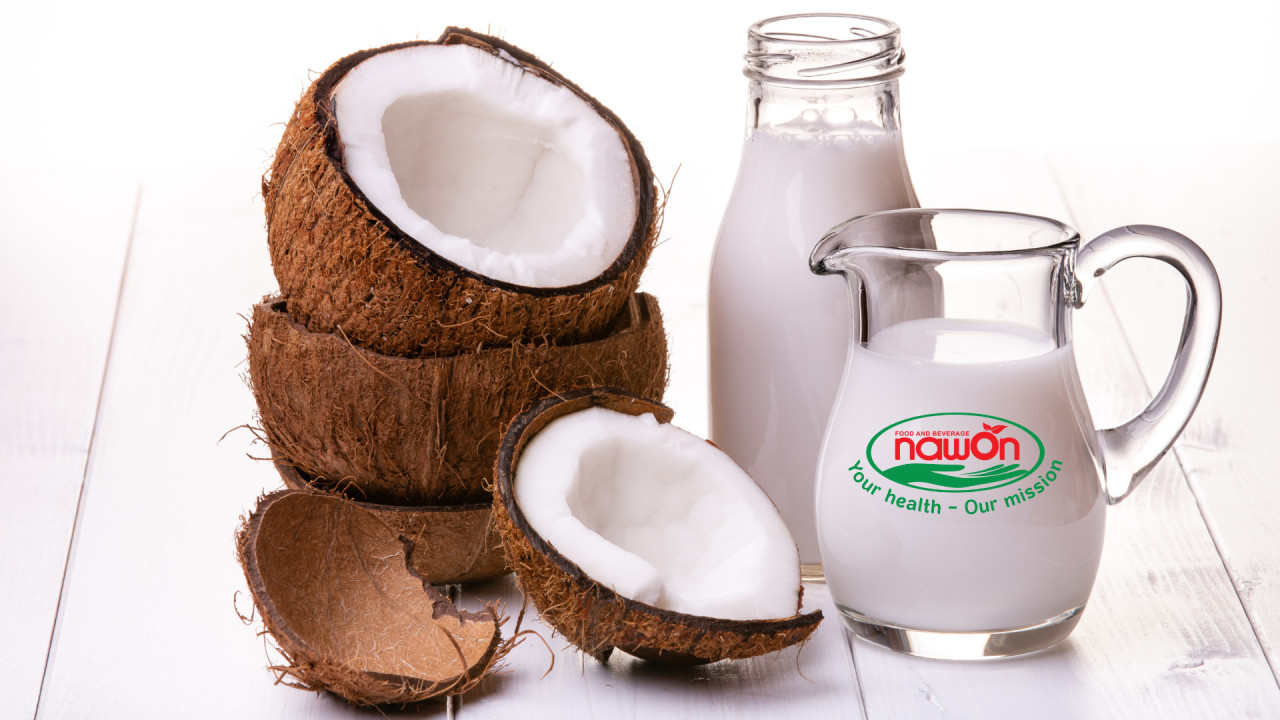
Read more: Is Coconut Water Keto Friendly?
The difference in health benefits of coconut water and coconut milk
What are the nutritional benefits of coconut water?
Coconut water is a natural, electrolyte-rich beverage that hydrates the body and contains essential electrolytes like potassium, sodium, magnesium, and calcium, supporting fluid balance and muscle function. With low calories and natural sugars, it’s a healthier hydration option.
Rich in potassium, it promotes heart health and helps regulate blood pressure. It also offers vitamins C and B and minerals, supporting energy metabolism and immune function. Its antioxidants combat oxidative stress, and its fiber aids digestion.
As a natural alternative to sports drinks, coconut water replenishes fluids lost during exercise and is cholesterol-free and low in fat. Its low calorie and sugar content makes it suitable for weight management. However, individuals with specific health conditions should consult a healthcare professional before regular consumption.
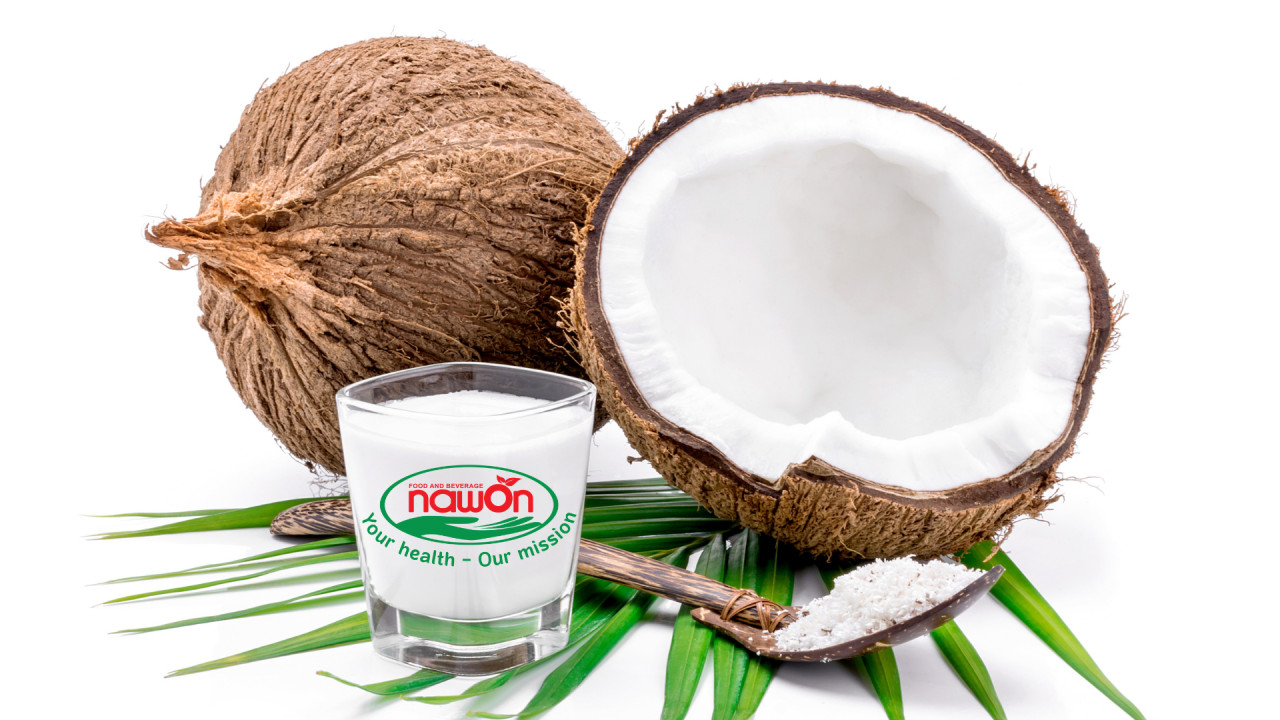
What are the nutritional benefits of coconut milk?
Coconut milk is rich in healthy fats, particularly medium-chain triglycerides (MCTs), which provide quick energy and are less likely to be stored as body fat. It contains vitamins C, E, and several B vitamins, as well as essential minerals like iron, magnesium, potassium, and phosphorus, supporting various bodily functions.
A good source of manganese, coconut milk promotes bone health and metabolism. While it has less fiber than whole coconuts, it still aids digestion and enhances satiety. The lauric acid may have antibacterial properties and support immune function.
As a popular plant-based alternative to dairy, coconut milk is suitable for those who are lactose intolerant or vegetarian. MCTs can also help with weight control by increasing satiety and energy expenditure. However, due to its relatively high calorie content, it’s important to consume coconut milk in moderation and balance it with other nutrient-rich foods.
Coconut water and coconut milk are distinct products with different compositions and uses. Choose coconut water for hydration and electrolyte replenishment and coconut milk for cooking and adding a creamy touch to your favourite recipes.
